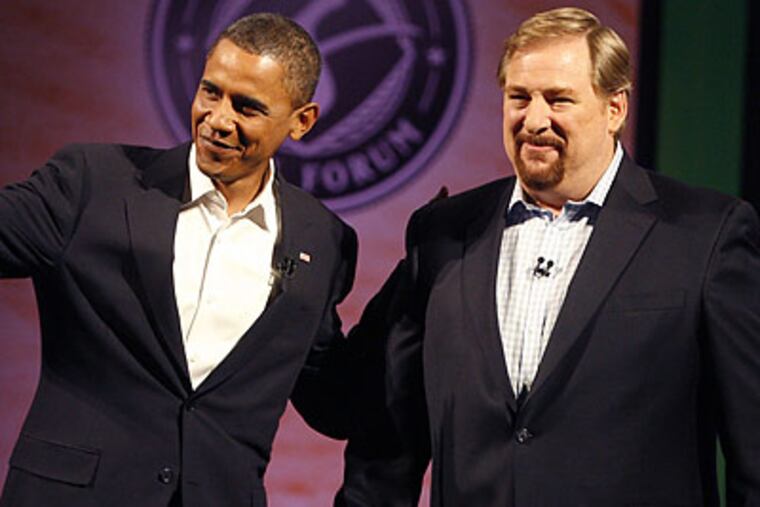
Americans are divided on Barack Obama's selection of Rick Warren, author of the runaway bestseller
The Purpose Driven Life
, to deliver the invocation at his presidential inauguration.
Most of the attention surrounding the selection of Warren has focused on his opposition to gay marriage and his disagreements with Obama on other social issues. But for historians, the choice of Warren will mark a new era in presidential-pastor relations. His name, after all, is not Graham.
Billy Graham has played a prominent role in almost every presidential inauguration since 1965. (Graham did not pray or preach at the inauguration of Jimmy Carter, a fellow Southern evangelical).
Graham preached special sermons at the inaugurations of Lyndon Johnson and Ronald Reagan. He delivered the invocation for Richard Nixon, George H.W. Bush, and Bill Clinton. In 2001, Franklin Graham pinch-hit for his ill father at the inauguration of George W. Bush.
Now, as the Obama inauguration draws near, Graham, struggling with the effects of Parkinson's disease, has faded from the scene. The man who has blessed six presidential administrations does not have a close relationship with Obama.
Moreover, Graham does not fit well with Obama's youthful message of "change." I know some Christian college students who have never heard of him.
Ever since Graham got too cozy with Nixon, he has made every effort to stay as vague as possible on social and political issues. Yet, as an evangelical, Graham is anti-abortion, anti-gay marriage, and is opposed to stem-cell research.
Or is he? I can't remember a time when he ever talked extensively about these things. Graham worried that delving into such polarizing issues would hurt the cause of the gospel. His primary vocation was that of a Christian evangelist.
Warren, on the other hand, has a very different style. He invites politicians to speak at his Saddleback Community Church in California. He does not shy away from stating his opinions on gay marriage, abortion, and stem cells. He does interviews that anger both Christian conservatives and secular liberals.
Warren may be called "America's pastor," but he brings controversy with him wherever he goes.
I wonder whether those who oppose Obama's choice of Warren are upset about his moral convictions or are they bothered more by his willingness to speak about these convictions in public?
I don't seem to remember any substantial criticism of Billy Graham's inaugural invocations or his role as a pastor to the presidents.
I am sure that there are political reasons why Obama asked Warren to pray at the inaugural. The president-elect wants to appeal to the evangelicals who voted for him. He wants to show that he is serious about unifying the country by bringing civil people of all religious and cultural persuasions to the table.
Obama should keep Warren close. He and the Saddleback minister may disagree on some subjects, but Warren will make sure that Obama understands evangelicals.
Warren could be more than a Graham-like spiritual counselor. He could hold the president accountable to some of the promises he made to Christian leaders during the campaign.
If Warren becomes the ministerial darling of the Obama White House, he will certainly redefine that role. Warren is no Billy Graham, but for many evangelicals, especially younger evangelicals who follow him and are inspired by him, that may be a good thing.